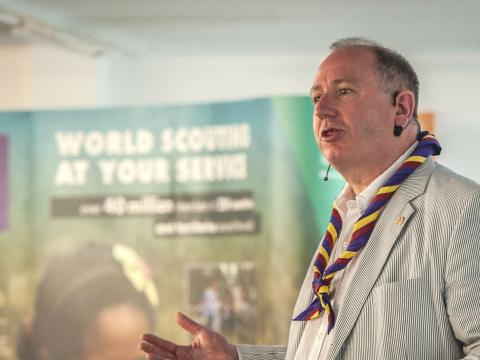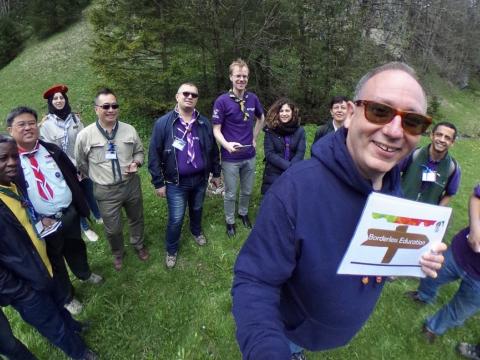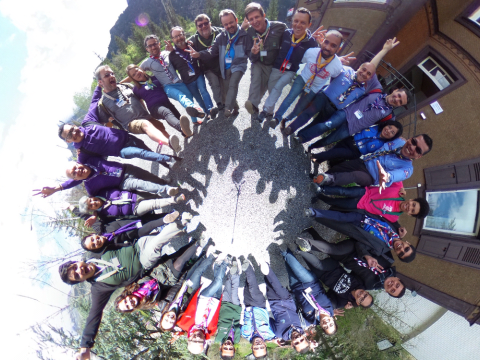"Young people don’t know how to take risks"

He entered the hall in a suit but decided that he had to put a scout scarf around his neck in order to feel home. John May, Secretary General of the Duke of Edinburgh`s International Award started the second day of the 2nd World Scout Education Congress in Kandersteg. His presentation focus was on risks – or rather lack of risks.
The three Rs, reading, writing and arithmetic, might be well known for some. John May however questioned them all and said that they needed updating. To accompany them, he launched five new R’s; Roots, Risks, Relationships, Resilience and Relevance.
“When I was a child, my brother and I were pushed out from the home into the fields to play by our dear mother at 8 o’clock in the morning. Come back in time for dinner, she said, since she wanted us to learn how to take risks”, says John May.
He continued to talk about that young people don’t learn to take risks, because they are now overprotected by parents who timetable their free time and ferry them from playdate to playdate.
“Youth need roots to grow and wings to fly”, John May said.
He talked about the importance of organizations such as the Scouts that allow young people to learn to take risks in safe surroundings, supported by adults.
“We as scout leaders are the first adults that young people choose to be their leaders. Scouting teaches us to fall over and get up again. We can help nations build”, he said
After the keynote speech, a number of sessions were arranged. One of them was about the outcome of the better world framework. It was a very warm session in the beautiful KISC tower in the middle of the Kandersteg nature. Questions that were discussed were, among others, how to use the world program, how to translate it into a national plan, and have Rovers actually taking part in all the possible actions. When defining some of the potential actions, a next step was to link them to the Global Goals.
When discussing Powerful Partnerships, the participants were sitting around a campfire and needed to reflect; What if one day I suddenly have to leave my country? What would happen if I need to go somewhere and not knowing if my skills will be recognised, if I will understand the language and if people would understand me. The result: Scary.
But: What if, when arriving to a destination, scouts or other volunteers are ready to help, to give assistance? Scouts that are trained by the Red Cross, cooperate with local community, in order to offer better integration. Then there is time to be welcomed.
Another session was about Management of volunteers. During the session it was discussed the importance of attracting sufficient volunteers in order to be able to reach our vision 2023 - growing scouting to 100 million members. If we wish to grow in a sustainable way we need to attract and train adult volunteers to provide a qualitative program for our youth members.
The discussion further developed to strengthening the retention of adults in Scouting, and how to ensure volunteers continue to enjoy and be rewarded in a valuable way.
The scouts discussed the need for smart and innovative ways of reaching out and bringing new volunteers on board, taking into account their needs, their sometimes limited availability and also their need for recognition at times.
Morning discussions at #ScoutCongress #theta360 - Spherical Image - RICOH THETA
Some of the best practices and solutions that were generated were the following five trends:
Increasing non-formalisation of formal education. Scouting provide:
- Forming partnerships with formal educational institutions
- Learning “soft skills” (but also sometimes hard skills)
- Promoting “21st Century Skills” as part of our programme using the element of “learning by doing”
A second trend is shifting demographics and an aging world population. Scouting tackles this by:
- Changing training methodologies
- Recognition of “soft skills” of adults
- Developing methods of recruitment of young adults and strategies for supporting the transition from rovers to leaders
- Programme which enables young people to be empowered for entrepreneurship, volunteering, decision making, taking responsibility
Migration, mobility and urbanisation is another trend which Scouting responds by:
- Increased flexibility in opportunities for volunteering for young adults
- Preparedness to also support children and young people in circumstances where they face harm outside Scouting.
- The youth programme contains relevant aspects responding to situations of emergency and enables NSOs to offer assistance to others in need.
The next trend is the expansion of the virtual world and the increase in prominence of digital natives, which Scouting can help by:
- Replace adult training focused on knowledge transfer with online learning.
- Explore new methodologies to deliver Youth programme.
Scouting responds to globalisation and the emergence of a global culture through:
- Continuing to open discussions on Spiritual development with the youth.
- Providing a space for volunteers to get connected with other people, and exchange experiences.
- Community Development projects that help scouts to develop from all areas of personal growth and become active citizens and ready for life.
- The better world framework, scouts have engaged themselves in various activities which they then use to demonstrate the social impact. The best practices from scouts have also inspired local action to generate global impact.
Roundtable discussions... #theta360 - Spherical Image - RICOH THETA
Last, but absolutely not least of the congress’ second day, was the International Evening, where almost all countries showed some specialities – and offered local food but also some showcased parts of their national program and educational tools. We live streamed a glimpse from the evening, which could be seen here:

